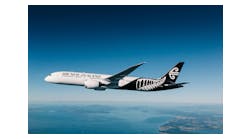Jan. 14--The first time the world's biggest passenger aircraft, the Airbus A380, landed in India in 2007 it happened to be flying in Air Deccan's founder G.R. Gopinath from the French city of Toulouse.
It was meant to be a grand show -- put up by none other than Kingfisher Airlines Ltd's Vijay Mallya, the sole Indian buyer of the $300 million super jumbo jet made by the Toulouse-based Airbus.
With its premium service, Kingfisher was then the toast of the aviation world, and the nation's rich and famous, including leading politicians, descended on Delhi airport for a joyride on Mallya's personal invitation.
By contrast, Air Deccan, the low-cost airline where passengers had to pay for their sandwiches and make a run for seats like in a school bus, was then struggling for funds.
At a press conference called to showcase the same A380, Mallya had announced he was interested in buying Deccan. Indeed, it was "imminent", he declared, taking reporters who had packed an aircraft hangar in Delhi airport's blistering heat, by surprise.
The news made headlines and Deccan's Gopinath -- like Mallya, a Bangalorean -- was furious.
"We are from different planets; he is from Venus, I am from Mars," Gopinath said, as he got off the A380 with Airbus global sales chief John Leahy and its then India head Kiran Rao.
"We are from the opposite ends of the business spectrum, consumer models and consumer space. We are mining the bottom of the pyramid, he is picking the cream off the top. They can't co-exist. One airline will only kill the other."
Yet, only a few months later, as investors piled on pressure, he sold Deccan to Kingfisher, saying it was in the best interests of the airline.
The two airlines were then merged, even though Gopinath had said they would operate separately -- one a premium and the other a low-cost service.
Mallya had overruled him.
Five years later, Gopinath's dire prediction, it seemed, had come true -- Kingfisher grounded its operations in October 2012 after limping on for a year and posting record losses.
Since then the airline has insisted it is on the verge of securing financing but this has failed to materialize, prompting unpaid employees to go on hunger strikes.
On Monday, Kingfisher appeared to have lost all hopes of a revival after being slapped with global damnation. Leahy, speaking at Airbus' internationally televised annual forecast of sales, said the manufacturer had cancelled Kingfisher's orders for five A380s, as also a similar number of A350 long-haul jets.
"The Kingfisher order -- not all of it was cancelled, there are still some single aisles. Speaking with Mallya, he is still determined to sell the airline; he has an operating certificate. But even if he does sell the airline, we took the decision internally here that he probably does not need the A380s just right now so we are taking them out of the order book along with the A350s," said the man who had flown on the first Airbus A380 sortie to Delhi.
Kingfisher was the only airline selected for this tone during the one-and-a-half hour press conference, which could make it difficult for it to lease any aircraft from the international market.
On Monday, 2005 must have seemed a long way off to Kingfisher.
Kingfisher ordered all sorts of planes when the good times began rolling in 2005, including the four-engine long-haul jet Airbus A340 to connect the two silicon valleys, San Francisco and Bangalore.
Typically, airlines order one or two class of planes to save on spare part, engineering and manpower costs.
But, like the A380 which never found full Kingfisher colours, the A340 too remained on ground for months, costing the company millions of rupees in rent.
It never even made a commercial flight, and some joked that its stylish fittings, including in its toilets, made the planes too heavy to fly non-stop between Bangalore and San Francisco.
Eventually, Airbus had to find buyers in Africa to redirect the Airbus A340 assets there.
This was just the start of Kingfisher's problems. In 2010, the airline was hit by a major engine maintenance problem in its Airbus A320 fleet. Dozens of its aircraft had insufficient guarantees in place in the contract with the engine manufacturer (unlike rivals IndiGo, which too faced similar issues). They were grounded, and the airline started piling more costs as revenue shrank.
But the colourful Mallya refused to admit that things were going wrong even as his flagship UB Group came under strain helping Kingfisher.
"Ooo la la la le o Ooo la la la oo le o... Someone asked me why I owned a booze company and an airline...I said "both make u fly"! Cheers!" Mallya tweeted with the signature Kingfisher beer jingle on 28 April 2010.
But by the year-end things were looking really bad, and the billionaire beer baron was touring the world in search of funds.
"On a hectic road show meeting potential investors in the planned Kingfisher Airlines equity raise. Amazing to see smart Indians managing billions...Kingfisher Airlines has faced unprecedented difficulties over the past 1 year but our staff has done a superb job of maintaining quality," he said on 9 October 2010, adding -- "One by one each hurdle has been addressed squarely and resolved. Now watch Kingfisher India's only 5 star airline REALLY fly..."
The hurdles never stopped coming his way.
Banks tightened the noose on Kingfisher to pay up loans after it was grounded; and taxmen impounded Mallya's personal Airbus A320 jet labelled VT-VJM (after his initials) -- one of the world's most luxurious aircraft, adorned with original Picasso paintings.
The jet is still parked in an isolated corner near the Mumbai airport runway, cocooned in dust, with its nose peering over the airport's perimeter fence onto Mumbai's famous slums.
Copyright 2014 - Mint, New Delhi




